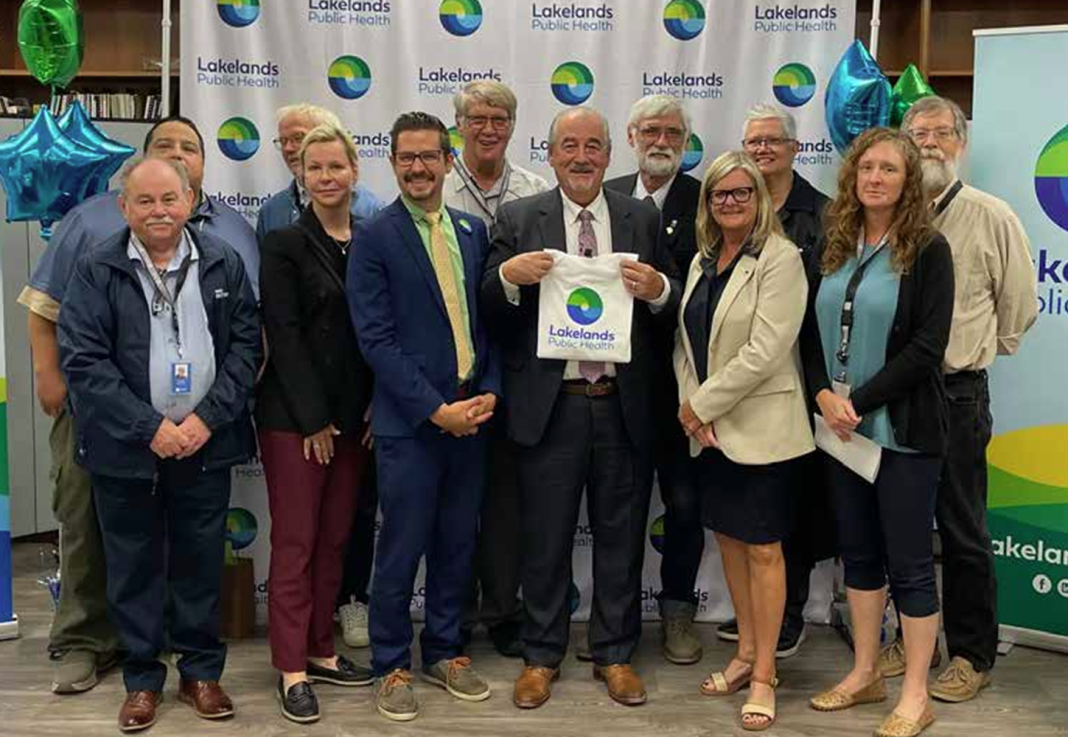The recently-merged public health agency covering Haliburton County, Kawartha Lakes, Northumberland County and Peterborough launched a new brand identity last week – now collectively known as Lakelands Public Health (LPH).
The union between the Haliburton, Kawartha, Pine Ridge district health unit (HKPR) and Peterborough Public Health (PPH) was approved by both boards and the provincial government in December 2024, coming into effect on Jan. 1.
The decision was made after the figurehead of each agency – Dr. Natalie Bocking at HKPR and Dr. Thomas Piggott at PPH – said annual funding increases from the Ministry of Health, capped at one per cent for the next three years, weren’t enough to maintain current service levels.
The Ontario government has committed $10.1 million to support the partnership – with $2.5 million of that used to pay off a mortgage on PPH’s home base at 185 King St. in Peterborough, which will serve as Lakelands Public Health’s headquarters. All former HKPR offices, in Port Hope, Lindsay and Haliburton, will be maintained as satellite locations.
Unveiling the new brand Sept. 11, Piggott, LPH’s medical officer of health, said the transformation reflects a unified vision for advancing public health across the region.
“This is more than a new name and logo, it’s a commitment to building a healthier future together for generations to come,” Piggott said. “By bringing our teams, expertise, and resources under one identity, we’re better equipped to meet the evolving needs of our communities.”
He said people will continue to access “the wide range of public health programs and services they rely on,” such as immunizations, infectious disease prevention, environmental health and emergency preparedness.
When announcing the merger, the two health units committed to continuing all existing programs and maintaining existing staff levels. HKPR employed about 170 people and PPH 130 people.
LPH board chair Ron Black said the merger, now nine months in, has enhanced coordination and partnerships with many other health-related organizations across the region.
He believes the new brand identity “reflects who we are today and the collective impact we will have moving forward.
“Our communities deserve a strong, unified public health system that responds to local priorities while preparing for future challenges,” Black said.
The transition will be phased in over several months, with updates to signage, online platforms and program materials. A new website has been launched – for more information, visit lakelandsph.ca.
New drug lead
The Haliburton, Kawartha Lakes, Northumberland Drug Strategy announced Ashley Smoke has joined the group as its new drug strategy coordinator.
With over 10 years of experience in harm reduction, overdose response, Indigenous health systems, and as someone with lived experience, Smoke brings a fresh perspective and a deep commitment to promoting health, safety and resilience, said the group’s board chair, Dane Record.
“We’re excited to welcome Ashley to this important role. Their experience and passion for community engagement will strengthen our collective efforts to address the complex challenges of substance use with compassion strategy and innovation,” Record said.
In her new role, Smoke will lead the implementation of the local drug strategy – a collaborative, evidence-informed approach aimed at reducing substance-related harms through prevention, education, harm reduction, treatment and enforcement partnerships.
“This is a critical time to come together as a community and take bold, coordinated action,” said Smoke. “I intend to highlight the great community work in motion and look forward to finding sustainable funding solutions to improve those efforts already underway.”
As of Aug. 31, there have been 153 emergency department visits in Haliburton County, Kawartha Lakes and Northumberland County due to drug overdose, with 26 suspected opioid-related deaths.
For more information, or to access support and services, contact coordinator@ hkprdrugstrategy.ca.





